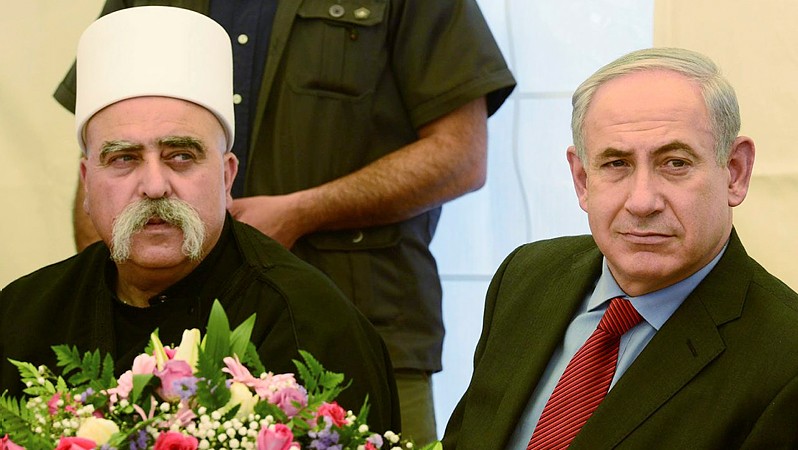When We’re in Uniform They Treat Us Well’: Israel’s Druze No Longer Feel Like Blood Brothers
تقرير من الهآررتس يتناول وضع الدروز في أسرائيل الذين فقدوا شعورهم أنهم إخوة بالدم مع اليهود بعد قانون يهودية إسرائيل
Noa Shpigel/Haaretz/July 29/18
The new nation-state law has given members of Israel’s model minority the feeling they’ve been betrayed: ‘We’re blood brothers when someone dies but now we’re second-class?’
On Wednesday, Education Minister Naftali Bennett tweeted a half apology, half excuse. “After conversations with many of our Druze brothers, it seems that the way the nation-state law was legislated actually hurt them and those who have tied their fate to the Jewish state.”
As the head of the Habayit Hayehudi party put it, “These are our blood brothers who stand shoulder to shoulder with us on the battlefield and who have entered into a life covenant with us. We, the government of Israel, have the responsibility of finding a way to repair the rift.”
It seems that for years nothing has been said about the Druze that doesn’t include the words “blood,” “brothers” and some form of “covenant.” (Once this was more commonly a “covenant of blood,” today it’s more often a “covenant of life.”)
The good news is that the Druze no longer buy this. “It’s lip service,” said Munib Fares from the northern Druze town of Hurfeish immediately after he saw Bennett’s tweet. “What do you think, the Druze are stupid? We’re not stupid anymore. This is a different generation. Where were you during the vote, Bennett?”
In his and his wife Nasim’s pastry shop in the town on Mount Meron near the Golan Heights, Fares tossed the question into the air – and it remained unanswered.
The nation-state law that passed in the Knesset last week has angered the Druze community. The fight began when the three Druze MKs – Akram Hasoon (Kulanu), Saleh Saad (Zionist Union) and Hamad Amar (Yisrael Beiteinu) – petitioned the High Court of Justice against the new law. Also, a forum of reserve army officers formed to fight the legislation.
Finally, an emergency meeting was held on Thursday evening at Saad’s home, which included Zionist Union’s Tzipi Livni, who was recently tapped as the next opposition leader. It also included the spiritual leader of the Druze community, Sheikh Muwafak Tarif. And of course, there were angry posts on social media.
For years the Druze have felt they deserve a special status in Israel, partly because they’re drafted into the army; they’re not volunteers. Now many of them feel betrayed and say the country is treating them like second-class citizens – like other minority groups.
Fares, a former journalist who worked for years for public broadcaster Channel 1, says the new law “has no value, it’s a purely populist law. This is another attempt by [Prime Minister Benjamin] Netanyahu to overtake Bennett from the right.”
Fares thinks the commotion has been overdone, but he views the law as harming Zionist and democratic values. “It erased the principles from the Declaration of Independence. Netanyahu isn’t any smarter than [Menachem] Begin and [Ze’ev] Jabotinsky,” Fares said, referring to right-wing leaders from yesteryear.
“This is particularly an attack on the Druze and everyone who serves the country according to the law. It doesn’t add honor to the nation, and not to how we look outside Israel either.”
Fares’ expectations from the country’s leaders are very low; he says the new law “will disappear from the agenda, and Netanyahu will find something new. He always invents something new to scare us.”
‘Don’t steal the feeling’
What can the Druze do? Fares’ mentions “all the Druze who 30 years ago made an effort to disconnect from the Arab nationality and who gave their children [Hebrew] names like Rami, Dudu, Osnat and Rinat in the hope of erasing the Arab nationalism and drawing close to the Jews.” He proposes that they “return to their roots after this spitting in their faces. What’s wrong with Ahmed, Elias, Fatma and Tuhfah?”
Nasim Fares says the two were at a graduation ceremony for their son who finished a medic’s course in the army. They showed pictures of one of their grandsons, 4 months old, saluting (with his mother’s help) in front of the parade grounds while the Israeli anthem was being played.
“I feel proud,” she said. “Don’t steal the feeling of belonging to the country from us. I’m an Israeli Druze in every way; so are my children and grandchildren. This isn’t just the country of the Jews.”
Hurfeish is filled with soldiers and officers, including those in the reserves. At the entrance to the town, alongside the road that leads to the cemetery, is a huge sign with pictures of Kamil Shanan, from Hurfeish, and Hael Sathawi, from Maghar. These are the two Druze police officers who were killed last year by three Israeli Arabs just outside the Temple Mount in the Old City of Jerusalem.
For F., a resident of Hurfeish who serves in the security forces, the nation-state law is less worrying than the condition of the town. “We pay a heavy price but we love it,” he said. “There isn’t a house here without an Israeli flag.”
Last year was the first year since 1995 that a little bit of land was freed up for construction. “The community is suffocating, like all the Druze communities,” he said. “They don’t even fix the road.”
Still, he supports the new law. “The Arabs are multiplying too much,” he said. “Finally they’re starting to take control with the law over the Arabs in the south with the polygamy.”























